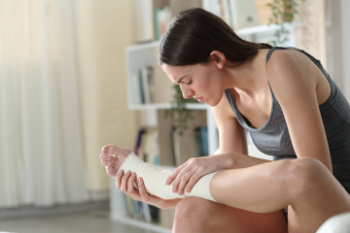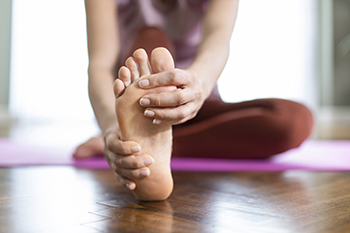
Stress fractures in the feet are hairline cracks in the bone caused by repetitive stress or overuse, often affecting the long bones of the foot. Stress fractures typically develop gradually, with early signs like localized pain that worsens with activity and improves during rest. Swelling, bruising, and tenderness when pressing on a specific area of the foot may also occur. Runners or other athletes who increase exercise intensity too quickly, wear worn-out shoes, or regularly train on hard surfaces are more likely to develop stress fractures. Women with low bone density may face added risk. A podiatrist can diagnose stress fractures using a clinical exam and imaging tests, such as MRI or bone scans, when X-rays do not reveal the injury. Depending on the severity of the fractures, treatment may involve wearing protective footwear, modified activity, or using crutches to reduce pressure on the affected area. In some cases, surgery may be needed to ensure proper healing. If you have symptoms of stress fractures in the feet, it is suggested that you schedule an appointment with a podiatrist for appropriate treatment options.
Activities where too much pressure is put on the feet can cause stress fractures. To learn more, contact Eveleigh Williams, DPM from Sole 2 Sole, PC. Our doctor can provide the care you need to keep your pain free and on your feet.
Dealing with Stress Fractures of the Foot and Ankle
Stress fractures occur in the foot and ankle when muscles in these areas weaken from too much or too little use. The feet and ankles then lose support when walking or running from the impact of the ground. Since there is no protection, the bones receive the full impact of each step. Stress on the feet can cause cracks to form in the bones, thus creating stress fractures.
What Are Stress Fractures?
Stress fractures occur frequently in individuals whose daily activities cause great impact on the feet and ankles. Stress factors are most common among:
- Runners
- People affected with Osteoporosis
- Tennis or basketball players
- Gymnasts
- High impact workouts
Symptoms
Pain from the fractures occur in the area of the fractures and can be constant or intermittent. It will often cause sharp or dull pain with swelling and tenderness. Engaging in any kind of activity which involves high impact will aggravate pain.
If you have any questions please feel free to contact our office located in Olympia Fields, IL . We offer the newest diagnostic and treatment technologies for all your foot and ankle needs.

Toenails can fall off for a number of reasons, including injury, infection, or underlying health issues. Trauma, such as stubbing a toe or dropping something heavy on it, may cause blood to collect under the nail, called a subungual hematoma, which can lead to toenail loss. Fungal infections can also weaken the nail, causing it to become discolored, thickened, and brittle until it detaches from the nail bed. Skin conditions like psoriasis may damage the nail matrix and lead to nail separation. Certain health conditions, like diabetes or poor circulation from peripheral artery disease, can limit blood flow to the feet and make the nails more prone to falling off. Certain medications may affect nail growth and strength. A podiatrist can examine the affected nail and recommend proper treatment, including antifungal care, or monitoring circulation. If you have problematic toenails, it is suggested that you schedule an appointment with a podiatrist for appropriate treatment.
Toe pain can disrupt your daily activities. If you have any concerns, contact Eveleigh Williams, DPM of Sole 2 Sole, PC. Our doctor can provide the care you need to keep you pain-free and on your feet.
What Causes Toe Pain?
Most severe toe pain is caused due to a sports injury, trauma from dropping something heavy on the toe, or bumping into something rigid. Other problems can develop over time for various reasons.
Toe pain can be caused by one or more ailments. The most common include:
- Trauma
- Sports injury
- Wearing shoes that are too tight
- Arthritis
- Gout
- Corns and calluses
- Hammertoe
- Bunions
- Blisters
- Ingrown toenails
- Sprains
- Fractures (broken bones)
- Dislocations
When to See a Podiatrist
- Severe pain
- Persistent pain that lasts more than a week
- Signs of infection
- Continued swelling
- Pain that prevents walking
Diagnosis
In many cases the cause of toe pain is obvious, but in others, a podiatrist may want to use more advanced methods to determine the problem. These can range from simple visual inspections and sensation tests to X-rays and MRI scans. Prior medical history, family medical history, and any recent physical traumatic events will all be taken into consideration for a proper diagnosis.
Treatment
Treatments for toe pain and injuries vary and may include shoe inserts, padding, taping, medicines, injections, and in some cases, surgery. If you believe that you have broken a toe, please see a podiatrist as soon as possible.
If you have any questions please feel free to contact our office located in Olympia Fields, IL . We offer the newest diagnostic tools and technology to treat your foot and ankle needs.

Acute ankle sprains are a frequent injury in professional and non-professional baseball due to the high physical demands of the sport. These sprains often result from sudden movements such as sliding into bases, pivoting quickly, or landing awkwardly after a jump. The most common type involves the lateral ligaments on the outside of the ankle, but sprains can also affect the inner or high ankle ligaments. Players may experience pain, swelling, bruising, and instability. Diagnosis begins with a thorough physical examination to assess tenderness, range of motion, and joint stability. Imaging such as X-rays or MRI scans may be used to rule out fractures and evaluate ligament damage. If an ankle injury has occurred while playing baseball, it is suggested that you promptly consult a podiatrist who can accurately diagnose and offer effective treatment solutions.
Sports related foot and ankle injuries require proper treatment before players can go back to their regular routines. For more information, contact Eveleigh Williams, DPM of Sole 2 Sole, PC. Our doctor can provide the care you need to keep you pain-free and on your feet.
Sports Related Foot and Ankle Injuries
Foot and ankle injuries are a common occurrence when it comes to athletes of any sport. While many athletes dismiss the initial aches and pains, the truth is that ignoring potential foot and ankle injuries can lead to serious problems. As athletes continue to place pressure and strain the area further, a mild injury can turn into something as serious as a rupture and may lead to a permanent disability. There are many factors that contribute to sports related foot and ankle injuries, which include failure to warm up properly, not providing support or wearing bad footwear. Common injuries and conditions athletes face, including:
- Plantar Fasciitis
- Plantar Fasciosis
- Achilles Tendinitis
- Achilles Tendon Rupture
- Ankle Sprains
Sports related injuries are commonly treated using the RICE method. This includes rest, applying ice to the injured area, compression and elevating the ankle. More serious sprains and injuries may require surgery, which could include arthroscopic and reconstructive surgery. Rehabilitation and therapy may also be required in order to get any recovering athlete to become fully functional again. Any unusual aches and pains an athlete sustains must be evaluated by a licensed, reputable medical professional.
If you have any questions please feel free to contact our office located in Olympia Fields, IL . We offer the newest diagnostic and treatment technologies for all your foot and ankle needs.









